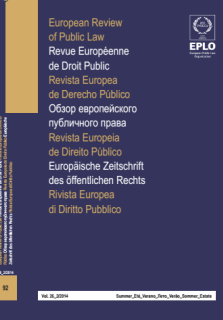
Jurisprudence
Constitutional / Constitutionnelle
2012
FRANCE
BERTRAND MATHIEU / MICHEL VERPEAUX
Professeurs à l'Ecole de droit de la Sorbonne-Université Paris 1 Panthéon-Sorbonne. Avec la collaboration de Marie-Odile Peyroux-Sissoko,
Doctorante contractuelle à l'Université Paris 1 Panthéon-Sorbonne
This chronicle covers the constitutional case law of 2012, both in the framework of the a priori litigation (17 DC decisions) and in that of the a posteriori litigation (74 QPC decisions). The electoral litigation is also presented (3 SEN decisions, 13 PDR decisions and 83 AN decisions). This year, a bit special because of presidential and legislative elections, an activity different from the one observed during non-electoral periods has been imposed to the Constitutional Council. The suspension of parliamentary proceedings during the first semester of 2012, the arrival of a new presidential and parliamentary majority, some high-profile decisions of the Constitutional Council (for example, the decision n° 647 DC regarding the law aiming at combating the denial of genocides recognized by law, as well as decisions n° 233 QPC of Marine Le Pen, n° 240 QPC on sexual harassment, n° 271 QPC concerning bullfights), but also the electoral litigation have given the year its rhythm. However, we have not found a radical change in comparison to previous semesters as far as the number of QPC decisions is concerned, given that the a posteriori litigation was stabilized. Some decisions can be highlighted. By means of its decision n° 4538 SEN the Constitutional Council has developed its case law as far as control in the framework of electoral litigation is concerned. Breaking with its past case law line, the Council has chosen to examine the constitutionality of a legislative provision both as an electoral judge and as a QPC judge. As far as QPC litigation is concerned, the Constitutional Council has clarified its position as far as rights and liberties that can be invoked in the framework of a QPC are concerned. In its decision n° 4538 SEN, the Constitutional Council has also recognized the pluralism of ideological currents and opinions as part of rights and liberties guaranteed by the Constitution and thus invocable in the framework of a QPC. Finally, as far as the composition of the Constitutional Council is concerned, the previous chronicle stated that as a former President of the Republic, Nicolas Sarkozy became ex-officio member of the Council in 2012. However, after the rejection of his electoral campaign accounts by the Council with its decision n° 156 PDR (4 July 2013), the former President of the Republic decided to "resign". This decision has had some impact, given that the ex-officio members cannot resign from the Constitutional Council because they have not been nominated and because there is no constitutional provision for such a possibility. This unheard-of situation has brought back into debate the question of the ex-officio members of the Constitutional Counil, that is, the former Presidents of the Republic, within the constitutional jurisdiction.
La présente chronique couvre la jurisprudence constitutionnelle rendue en 2012, tant dans le cadre du contentieux a priori (17 décisions DC) que dans celui du contentieux a posteriori (74 décisions QPC). Le contentieux électoral est également traité (3 décisions SEN, 13 décisions PDR et 83 décisions AN). Cette année, un peu particulière du fait des élections présidentielle et législatives, a imposé au Conseil constitutionnel une activité différente de celle observée hors période électorale. La suspension des travaux parlementaires au cours du premier semestre 2012, l'arrivée d'une nouvelle majorité présidentielle et parlementaire, quelques décisions très médiatisées du Conseil constitutionnel (par exemple, la décision n° 647 DC sur la loi visant à réprimer la contestation de l'existence des génocides reconnus par la loi, ou encore les décisions n° 233 QPC de Marine Le Pen, n° 240 QPC sur le harcèlement sexuel, n° 271 QPC relative aux corridas), mais aussi le contentieux électoral ont ainsi rythmé l'année. Toutefois, on ne remarque pas de changement radical par rapport aux semestres antérieurs en ce qui concerne le nombre de décisions QPC, le contentieux a posteriori s'étant stabilisé. Quelques décisions peuvent être ici mises en exergue. Par sa décision n° 4538 SEN, le Conseil constitutionnel a fait évoluer sa jurisprudence en matière de contrôle dans le cadre du contentieux électoral. Rompant avec sa jurisprudence passée, le Conseil a choisi d'examiner la constitutionnalité d'une disposition législative à la fois en tant que juge électoral et en tant que juge de la QPC. Concernant le contentieux en matière de QPC, le Conseil constitutionnel a apporté des précisions quant aux droits et libertés susceptibles d'être invoqués à l'appui d'une QPC. Egalement, dans sa décision n° 4538 SEN, le Conseil constitutionnel a reconnu le pluralisme des courants d'idées et d'opinions comme faisant partie des droits et libertés que la Constitution garantit et pouvant ainsi être invoqué au moyen d'une QPC. Concernant enfin la composition du Conseil constitutionnel, la précédente chronique précisait qu'en tant qu'ancien Président de la République, Nicolas Sarkozy était devenu membre de droit du Conseil en 2012. Toutefois, après que le Conseil a prononcé le rejet de ses comptes de campagne par sa décision n° 156 PDR du 4 juillet 2013, l'ancien Président de la République a décidé de "démissionner". Cette décision a eu un certain retentissement, les membres de droit ne pouvant pas démissionner du Conseil constitutionnel, faute d'avoir été nommés et faute de disposition constitutionnelle prévoyant cette faculté. Cette situation inédite a fait revenir dans le débat la question des membres de droit, c'est-à-dire des anciens présidents de la République, au sein de la juridiction constitutionnelle.





















